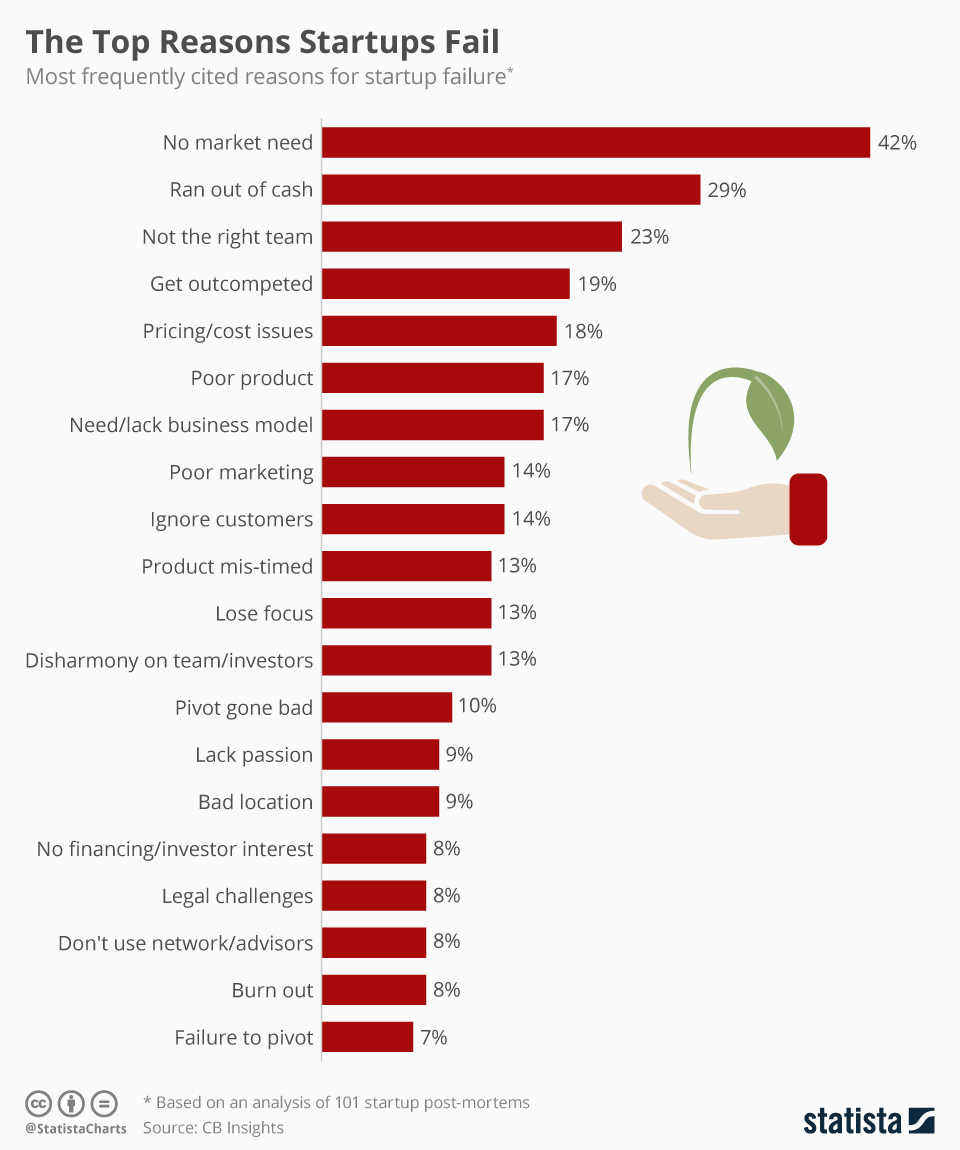
Most new companies go out of business in the first few years. This sad but true fact has been widely examined in the past, and recent studies confirm that the situation has not changed for better.
While there can be numerous reasons why startups don’t get past their first year and why established businesses go bankrupt, in this article we want you to take a look at the top five in order to have a better outlook on what pitfalls you should avoid when starting a new business.
-
Table of Contents
The Idea Doesn’t Solve a Problem
The modern entrepreneurship culture mistakenly puts a strong emphasis on creative thinking and the ability to generate ideas as the end-all-be-all for business success, but the truth is that no matter how bright the idea is, it doesn’t guarantee that it can be successfully commercialized. Many bright ideas vanish because they don’t satisfy a need of the audience large enough to provide a scalable growth for the business. Unfortunately for most entrepreneurs, they get too obsessed with their ideas rather than their validation. Simply put, they don’t bother examining whether their ideas are solving existing problems and make their judgment on what appeals to potential customers rather than what these customers need. This distinction between a mere appeal of a new product and its ability to solve an existing problem is where business failure and success part their ways.
Source:Statista
-
Insufficient Competition Research
The most common pitch among new entrepreneurs is that they are the first to introduce their product or service to the market and that nobody has ever tried to this before. However, very few newbie entrepreneurs consider that hundreds and even thousands of start-ups are popping up in every niche with the same or similar ideas every year. They also might not even realize that these ideas can be attractive to larger companies that have all the necessary resources to scale up their market presence and manufacturing volumes.Failing to conduct a competitive analysis and find out who else might be trying to enter the same niche can seriously undermine the survival of the future business.
-
Reducing Costs of Prototyping and Quality Assurance
Failing to perform proper testing and quality assurance for new products is another popular reason for startup failure. Saving on prototyping and quality assurance costs at the earlier stages of the entrepreneurial process will only come with more expenses down the road in the form of refunds, market recalls and customer complaints. A customer dissatisfied with the quality of the product or service is a nightmare for every business, and nothing can be worse than a poor reputation and negative reviews for a newly established enterprise.
-
Insufficient Team Expertise
Most startup teams exude a genuine passion for their new ventures. And, while the emotional drive can make a significant contribution to future success, it can’t beat the importance of industry- or business-specific knowledge and experience. The team’s technical knowledge and management skills oftentimes step in as vastly crucial to get an enterprise through the first years of its existence. Hiring employees can be one way to compensate for the lack of knowledge and skills, but this is more appropriate at the later stages of growth.Business success is usually a result of scaling up the founder’s talents and expertise, and it rarely comes from mere excitement or desire to run an independent business. Knowledge and the ability to manage others are not the only factors that determine business success or the lack thereof. Every industry, and particularly a new one, has its learning curve that very often can be a steep one and includes running into many pitfalls if you are not familiar enough with the underlying technology or the specifics of consumer behavior. Joe French of ExpressBadging.com, a company providing cloud-based employee badging solutions, describes the situation in his industry as a combination of low barriers to entry with high failure rate. Joe relates the failure of most competing companies to not being able to quickly build knowledge and skills that took his employees years to acquire.
-
Not Aligning Funding With Growth Requirements
If you were to ask hundreds of failed entrepreneurs why they failed without digging deeper into the root cause, perhaps most of them would point out insufficient funding as one of the biggest reasons. Oftentimes, you will hear this even from those whose ideas were doomed to fail due to other causes and where additional funding wouldn’t made a difference. But even if this biased thinking didn’t exist, the problem with funding insufficiency is not so far out of the entrepreneur’s control as many try to say it is. The proper way to put it is that funds are not available to those who are not able to attract them. Building future investor relationships and being able to successfully pitch your project to potential investors is a skill set that is not only important at the very beginning of the entrepreneur’s journey, but it also helps to sustain growth of the business in later stages.
Successes and failures are hard to predict with 100-percent certainty. Keeping in mind the main reasons why most startups fail should help you create a more successful blueprint for your future business success.
About the Author:
Dennis Rukosuev is an entrepreneur and business consultant from Austin, TX who is helping startups and established companies scale up their businesses and meet the demands of strategic growth and change.
LinkedIn Profile:
https://www.linkedin.com/in/dennis-rukosuev-86844941/


